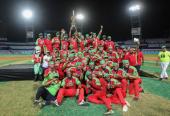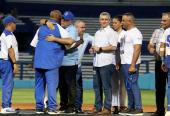Islamic State crisis: PM Abadi opposes Arab strikes in Iraq

In an interview, he said Western air power had "filled many gaps" in Iraq's fight against the jihadist group.
Several Arab states, including Saudi Arabia and Jordan, have joined the international coalition against IS.
Their aircraft have carried out strikes in Syria, but only those from the US, UK and France have hit targets in Iraq.
Talking to the BBC in Baghdad, Mr Abadi said Iraq's army would defeat IS "if we have good air cover" but stressed that no foreign ground troops were needed.
"We are very clear we will not accept any troops on ground except Iraqi troops," he added.

He warned that "international and regional polarisation" had contributed to the rise of IS - which has announced the creation of a "caliphate" in the large swathes of Iraq and Syria under its control - and said he wanted to improve relations with neighbouring countries.
Mr Abadi, a Shia Arab, formed a unity government in September after the resignation of Nouri Maliki, who was accused by Iraq's minority Sunni Arabs and Kurds of monopolising power and pursuing sectarian policies.
The US-led coalition has conducted more than 230 air strikes on IS positions in Iraq since August. The operation was expanded into Syria on 22 September, since when there have been more than 70 strikes.
Saudi Arabia, Jordan, Bahrain, Qatar and the United Arab Emirates have participated or contributed to the air campaign in Syria.
Mr Abadi said he had sent a delegation to Damascus to inform its neighbour of Iraq's request for the coalition to target IS in Syria, saying it was crucial to stop "transient border terrorism".


Earlier, US-led forces carried out air strikes on IS militants battling Kurdish fighters around the northern Syrian border town of Kobane.
Tens of thousands of people have fled across the border into Turkey since IS launched an offensive on the city two weeks ago.
The jihadists are said to be with 2 to 3km (1.2-1.9 miles) of Kobane, putting pressure on the Turkish government to take military action.
'Strikes only delay threat'
Ministers submitted a proposal to parliament late on Tuesday to allow Turkish troops to conduct operations in Syria and Iraq, and to allow foreign forces to use Turkish military bases.
Turkish President Tayyip Erdogan appeared to back the proposal, saying Turkey would "fight effectively against both [IS] and all other terrorist organisations within the region".
"Dropping tons of bombs from the air is only a temporary solution and only delays the threats and the danger of [IS]," he said in parliament.
Turkey shares a 1,200-km (750-mile) border with Iraq and Syria and is struggling to cope with an influx of about 1.5 million Syrian refugees.
If Islamic State fighters were to capture Kobane, also known as Ayn al-Arab, it would give the group unbroken control of a long stretch of the Syrian-Turkish border.
- Formed out of al-Qaeda in Iraq (AQI) in 2013, IS first captured Raqqa in eastern Syria
- It captured parts of Iraq in June, including Mosul, and declared a "caliphate" in areas it controls in Syria and Iraq
- Pursuing an extreme form of Sunni Islam, IS has persecuted non-Muslims such as Yazidis and Christians, as well as Shia Muslims, whom it regards as heretics
- Known for its brutal tactics, including beheadings of soldiers, Western journalists and aid workers
- The CIA says the group could have as many as 31,000 fighters in Iraq and Syria













Add new comment